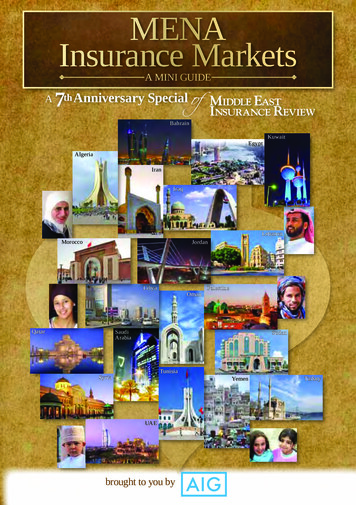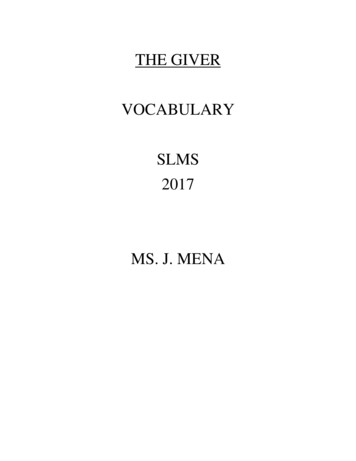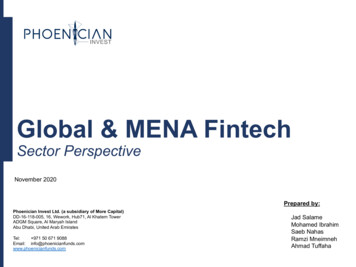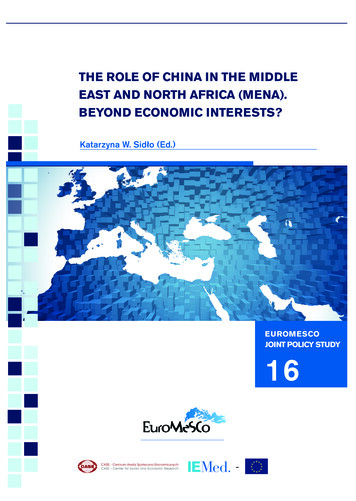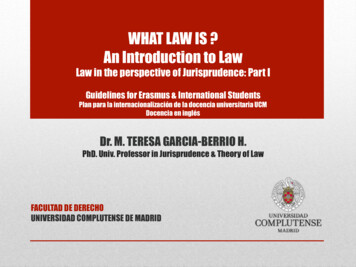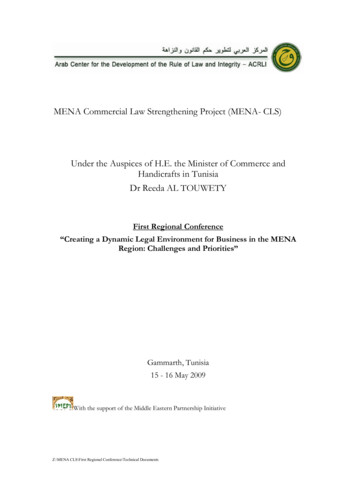
Transcription
MENA Commercial Law Strengthening Project (MENA- CLS)Under the Auspices of H.E. the Minister of Commerce andHandicrafts in TunisiaDr Reeda AL TOUWETYFirst Regional Conference“Creating a Dynamic Legal Environment for Business in the MENARegion: Challenges and Priorities”Gammarth, Tunisia15 - 16 May 2009With the support of the Middle Eastern Partnership InitiativeZ:\MENA CLS\First Regional Conference\Technical Documents
Day One: Friday 15 May 200916:30 – 17:30Registration17:30 – 18:00Opening SessionThe opening session will provide background information and set the tone forthe conference. Official Opening Statement(10 minutes)H.E Mr. Reeda AL TOUWETY, the Minister of Commerceand Handicrafts in Tunisia Statement of the United States Government(10 minutes)H.E. Mr. Marc DESJARDINS, Deputy chief of Mission, USEmbassy in Tunisia Statement of the Arab Centre for theDevelopment of the Rule of Law andIntegrity (ACRLI)and presentation of theprogramme(10 minutes)Mr. Wassim HARB, Founding Member and GeneralSupervisor, Chief Technical Advisor on MENA CLS Project,ACLRI18:00 – 20:00Plenary Session 1:Overall Assessment of the Business Climate in Project CountriesThis first plenary session will present and discuss the assessment that the projecthas made regarding some of the main characteristics of the Business Climate inthe four project MENA countries (Lebanon, Tunisia, UAE and Yemen). Itwill specifically focus on key risks (economic, social, legal, administrative etc.)and the various challenges associated with doing business in the projectcountries from a policy perspective.This plenary session seeks to help participants draw specific lessons and policyrecommendations for the project countries, as well as lessons that might haveimplications for business-climate development in the MENA region as a whole.Accordingly, the session is expected to address country-specific issues including,inter alia, socio-economic and geo-political elements that affect the businessclimate, current government policies, structural and institutional deficits, theimpact of the global economic/financial crisis and possible policy options forenhancing the business climate.Z:\MENA CLS\First Regional Conference\Technical Documents
Format: The session will consist of one general presentation on different economicelements and policies followed by four interventions from the panel of discussion on thebusiness environment in the involved countries. There will be strong involvement from thefloor through short two-minute comments/questions. The entire session will bemoderated by a high-level expert with a background in business and public policy. Theinterventions will build on the findings and recommendations of the economic andpolitical part of the “Comparative Commercial Law Assessment Report”. ChairpersonH.E Reeda AL TOUWETY, the Minister of Commerce and Handicrafts inTunisia Presenting the business and investment (20 minutes)environment part of the “ComparativeCommercial Law Assessment Report” and itsFindings on Business Risks in Project CountriesMr. Samir NASR, Economist, Head of "Etudes etConsultations Economiques", Regional Advisor on MENACLS Project The Business Climate in Lebanon: Challenges (15 minutes)and Policy Options for ReformMr. Roger MELKI, Economist, Lebanon The Business Climate in Tunisia: Challenges (15 minutes)and Policy Options for ReformMr. Loutfi BOU ZIANNE The Business Climate in the UAE: Challenges (15 minutes)and Policy Options for ReformMr. Mohammed AL MOHAIRY, Senior Legal Advisor,Director, Department of Strategy Legal Affairs, TheExecutive Council of Dubai, United Arab Emirates The Business Climate in Yemen: Challenges, (15 minutes)Risks and Policy Options for ReformMr. Mohamed HAWERI, Undersecretary for Studies Sector,Ministry of Planning and International Cooperation, Yemen Open DiscussionKey discussion issues include:Z:\MENA CLS\First Regional Conference\Technical Documents(30 minutes)
1. Geo-political advantages and challenges.2. Socio-economic elements affecting the business climate.3. Policymaking processes and the participation of non-governmentalactors mainly the business community.4. Role of public and private sectors partnership in the process of policymaking5. Re-visiting key policies (economic, tax, financial, banking etc.).6. Importance of a clear economic policy with development pillars7. Quality of performance in the public administrations and the impact ofcorruption and inefficiency on business environment8. Impact of global economic and financial crisis on Arab region, mainly onthe project countries9. Economic complementarity between the Arab countries10. Other key risks and related obstacles that face the economies of theproject countries and the entire Arab region.20:00Networking EventThe Networking Event is aimed at providing an informal space for interactionbetween participants from the four project countries. It will also witness theofficial launching of the project’s “Awareness Campaign” which seeks toserve two main functions (i) raising awareness among target beneficiaries aboutproject activities and results and (ii) deepening and advocating reformrecommendations that will be developed as a result of the project activities.The launching will be followed by an official dinner organized by ACRLI.Z:\MENA CLS\First Regional Conference\Technical Documents
Day two: Saturday 16 May 20099:00 – 10:30Two workshops will be held simultaneously where there will be a general discussion ofthe subjects addressed by the first plenary session on the Business andInvestment Environment in the Project CountriesWorkshop 1: National Business Climate Development StrategiesDeveloping the business climate in a given market requires concerted andcoordinated efforts that involve a multiplicity of stakeholders. A common indepth understanding of key issues and different approaches to developingnational business climate development strategies is critical in helping thesestakeholders identify appropriate responses to existing risks and challenges in amore effective and efficient manner.This workshop seeks to encourage discussion between policymakers andmembers of the business community on the strategic elements of businessclimate development, including assessments, indicators and model strategies.The workshop also seeks to encourage interaction between the public sectorand the private sector, with a view to encouraging partnership-building inrelation to the development and implementation of country-specific strategies.Format: The workshop will be organized in the format of a panel discussion of threewith strong interaction between the panel and the participants through two-wayquestions and answers. The entire session will be moderated by a high-level expert witha background in business development strategies and related policy reforms. He/sheshall work with the workshop’s Rapporteur to present an “Outcome Report” duringthe closing session. ModeratorMr. Chekib NOUIRA, President of the Arab Institute for the Head ofEnterprises, TunisiaRapporteur Assessing the Business Climate: Approaches (15 minutes)and Key IndicatorsMr. Julien LEVIS, Private Sector Development Specialist,FIAS, World Bank Group Business Climate DevelopmentDefinitions and the OECD ModelStrategies: (15 minutes)Mr. Alexander BOHMER, Head of Unit, ENA CLS\First Regional Conference\Technical Documents
Development Division The Role of the Private Sector and Public- (15 minutes)Private PartnershipsMr Youssef BOUHLEL, the Director General forproduction services at the Ministry of economicdevelopment and international cooperation in Tunisia Open Discussion.(30 minutes)Key discussion issues include:1. Different uses of global indicators for measuring the business climate.2. Using benchmarks and developing national indicators and user-surveysfor measuring the business climate.3. Adapting the model strategy to country-specific contexts.4. Advantages of public-private partnerships and related regulatorychallenges.5. Basic components of Business Enabling Environment6. Practical means to enhance the participation of the private sector inbusiness climate development.7. Consumer confidence indicators and relation to business climateWorkshop 2: Challenges for Investment, specifically Foreign DirectInvestment in the Project CountriesForeign Direct Investment (FDI) is an important tool for economic growth anddevelopment, especially in developing countries. Observers argue that the levelof FDI inflows into the MENA region is low compared to other developingregions of the world. One of the main reasons is the business climate in manyMENA countries, which is not fully conducive to attracting investors.This workshop looks at the state of investment, namely, FDI in the four projectcountries, presenting most recent data and discussing main incentives and keyobstacles with a view to drawing lessons, not only for policymakers, but also formembers of the legal and business community regarding their role in promotinginvestment and enhancing positive interaction between foreign and nationalcapitals.Format: The workshop will be organized in the format of a panel discussion of threewith strong interaction between the panel and the participants through two-wayquestions and answers. The entire session will be moderated by a high-level expert witha background in investment and economic development. He/she shall work with theRapporteur to present an “Outcome Report” during the closing session.Z:\MENA CLS\First Regional Conference\Technical Documents
Moderator RapporteurMr. Ali ZBEEB, Lawyer, University Professor - MENA-CLS ProjectCoordinator, ACRLI The State of FDI in Project Countries: (15 minutes)Incentives and ObstaclesMr. Kamal HAMDAN, Economist, Head of "Consultationand Research Institute" Inter-relation and Interaction between Foreign (15 minutes)and National CapitalsMr. Khaled YEHYA, Director of Arab PublicManagement Research Program; Professor of PublicAdministration & Policy The Role ofCommunitiestheLegalandBusiness (15 minutes)Ms. Najlaa KHAZZAN, Lawyer, Member of the BarAssociation in Yemen Open Discussion.Key discussion issues include:1. Impact of investment in general and of FDI on theeconomic growth (job creation, tax revenue,technology transfer, etc.)2. Factors that deter investment and possible responses.3. The role of government in attracting and maintaininglocal investment and FDI.4. The role of other non-governmental actors inattracting and maintaining FDI.5. Importance of the risk analysis and the impact ofinvestment decisions6. Privatization policies and impact on local investmentand FDI.7. Competition policies and impact on local investmentand FDI.Z:\MENA CLS\First Regional Conference\Technical Documents(30 minutes)
8.FDI and a possible role in enhancing integrity.9. Sustainability of FDI inflows.10:30 – 11:0011:00 – 13:00BreakPlenary Session 2:Key Priorities for Commercial Law Reforms in the MENA RegionThis second plenary session will present and discuss suggestions for lawreforms that would contribute to improving the business climate in the fourproject MENA countries (Lebanon, Tunisia, UAE and Yemen). It seeks todefine the different components and groups of the legal environment with aview to improve the quality of services and outputs offered by them. Itspecifically focuses on discussing key priorities of reforms in order to improvecurrent laws and regulations and related institutional arrangements, and tosuggest new ones based on the results of the work that has been done so far, atthe national level. Furthermore, the session will discuss capacity gaps in usingand implementing a number of these laws.Unlike the first plenary session which focused on policy issues, the secondplenary session will focus on concrete law-related reforms that will inform thenext set of activities under the project. Accordingly, the session is expected toaddress country-specific law-related issues including, inter alia, the need tomodernize aspects of the commercial law and introduce new legal institutions,the quality of commercial law texts, accessibility to the legal corpus, the capacityof the judiciary, the capacity of lawyers, red-tape and others.Format: The session will consist of one presentation addressing different legal andlegislative aspects of the regional report followed by four interventions on the methods oflegal reform in the involved countries with strong involvement from the floor throughshort two-minute comments/questions. The entire session will be moderated by a highlevel expert with a background in commercial law practice and related reforminitiatives. The panel will build on the findings and recommendations of the“Comparative Commercial Law Assessment Report” in relation withthe legal and reform part related to legislation development. Chairperson Presenting the Comparative Commercial LawAssessment Report and its Findings on Key LegalReforms in Project Countries.Mr. Wassim HARB, Founding Member and GeneralSupervisor, Chief Technical Advisor on MENA CLSProject, ACLRIZ:\MENA CLS\First Regional Conference\Technical Documents(20 minutes)
Key Commercial Law RecommendationsLebanon: Priorities and Obstacles.in (15 minutes)Mr. Antoine BASILE, International Economist andAttorney-at-Law, University ProfessorMs. Gizelle ZOUEIN, Lawyer, Ibrahim Najjar Law firm,Lebanon Key Commercial Law Recommendations in Tunisia: (15 minutes)Priorities and Obstacles. (15 minutes)Mr. Ahmed WORFALI, Key Commercial Law Recommendations in the (15 minutes)UAE: Priorities and Obstacles. (15 minutes)Mr. Habib MULLA, Founder and Manager Director ofHabib Al Mullah Law Firm, VP of council of trustees atDubai International Arbitration Council, UAE Key Commercial Law Recommendations in Yemen: (15 minutes)Priorities and Obstacles. (15 minutes)Mr. Ismael AL WAZIR, Former Minister of Justice, Memberof Yemeni State Council, President of Yemeni Centre forConciliation & Arbitration (YCCA)(30 minutes) Open Discussion.Key discussion issues include:1. Unification of the commerciallegislations in one code.andbusiness2. Introducing modern legal institutions to the existinglegal system.3. Effective mechanisms for the enforcement ofcontracts and recovery of debts.4. Enforcement of foreign judgments and arbitralawards.5. Intellectual property laws and ways to overcomepractical challenges.6. Legal protection for national and foreign investors.7. Specific judicial reforms needed to enhance the legalenvironment for business.8. Legal education and impact on the effectiveutilization and implementation of commercial laws.Z:\MENA CLS\First Regional Conference\Technical Documents
13:00 – 14:00Lunch14:00 – 15:30Two workshops will be held simultaneously where there will be a general discussion ofthe subjects addressed by the first plenary session on the Business andInvestment Environment in the Project CountriesWorkshop 3: Key Requirements to Improve the Legal Environmentfor Doing Business.Improving the legal environment for doing business is an indispensable elementof the effort to improve the business climate. This transcends the improvementof certain texts to a series of reforms. ACRLI understands the legalenvironment as including, laws, regulations, the judiciary and its supportingapparatuses, law enforcement authorities, and legal education, with twooverriding principles that govern all (i) the rule of law and (ii) integrity. In theMENA region, research and experience reveals key reform needs in almost allof these areas.This workshop looks at the key requirements to improve the legal environmentfor doing business in the four project countries, presenting expert analyses anddiscussing entry points with a view to drawing lessons that may inform futureproject activities and national reform efforts. In addition to contributing toknowledge-building, the workshop is also expected to encourage interactionbetween participants with a view to exploring ways to increase the drive behindsome of these reforms in each of the project countries.Format: The workshop will be organized in the format of a panel discussion of threewith strong interaction between the panel and the participants through two-wayquestions and answers. The entire session will be moderated by a high-level expert witha background in legal and judicial reforms. He/she shall work with the Rapporteur topresent an “Outcome Report” during the closing session. ModeratorMr. Elias CHALHOUB, Lawyer, MENA-CLS Project Manager, ACRLI RapporteurMr. Arkan EL SEBLANI, Legal Specialist, UNDP-POGAR The Role of Legislative Drafting(15 minutes)Mr. Zuheir ISKANDAR, Director General, Centre for Legaland Judicial Council The Quality of Legal Institutions and Services.Ms. Arlette ZAKARIAN, University Professor, Institute ofZ:\MENA CLS\First Regional Conference\Technical Documents(15 minutes)
Political Science, Paris Corporate Governance and Implications on the (15 minutes)Legal Environment for Doing BusinessMr. Rainer GAIGER, Attorney-at-law, International Advisoron MENA-CLS Project Open Discussion.(30 minutes)Key discussion issues include:1. Modern techniques and developed methodologies for legislative drafting(drafting the regulatory or legislative text)2. Bilateral and Multilateral Agreements.3. Regulatory impact assessment.4. Quality of judicial services and role of precedents.5. Approach and quality of legal education in law schools and judicialinstitutes.6. Challenges of regulating interaction between government and privatesector.7. Internal controls and compliance in the private sector.8. Databases to enhance access to commercial legal information.Workshop 4: The Case for Introducing Modern Legal Institutionsinto Legal Systems in the Project Countries.Modern legal institutions, though proven to improve the business climate indifferent legal systems across the globe, remain largely under-developed andunder-utilized in the MENA region. Key institutions in company law and otherareas such as competition and alternative dispute resolution stand to contributesignificantly to commercial law strengthening in the MENA region.This workshop is expected to contribute to the creation of a common languagebetween participants and to increase their understanding of these key modernlegal institutions. It is also expected to enhance interaction betweenparticipating members of the legal and business communities in the projectcountries and participating policymakers, with a view to advocating thetransposition of these legal institutions into the legal systems in the projectcountries.Format: The workshop will be organized in the format of a panel discussion withstrong interaction between the panel and the participants through two-way questionsand answers. The entire session will be moderated by a high-level expert with abackground in legal and judicial reforms. He/she shall work with the Rapporteur topresent an “Outcome Report” during the closing session.Z:\MENA CLS\First Regional Conference\Technical Documents
ModeratorMr. Mohamed KOLSI, Head of Competition Council, Tunisia RapporteurMs. Rola AKOUM, Legal Specialist, ACRLI Modern Forms of Companies(15 minutes)Mr. John SPANOGLE, University Professor, GeorgeWashington Competition Laws and Supporting Institutions(15 minutes)Mr. Frederic JENNY, Chairman of Competition Committee,OECD Alternative Dispute Resolution Mechanisms.(15 minutes)Mr. Sami HOUEIRBI, Director for Eastern Mediterranean,Middle East and Africa for ICC Disputes ResolutionServices. Open Discussion.(30 minutes)Key discussion issues include:1. Modernizing the company laws to allow new forms of companies andcontracts. (offshore, holding )2. Simplifying registration and dissolution procedures (ease of doingbusiness)3. Best of international practices and the Tunisian example in the area ofcompetition.4. Joining international conventions on the enforcement of arbitrationagreements and arbitral awards (the New York Convention.)5. Using commercial law to encourage the growth and mergers ofbusinesses.6. Other modern legal institutions (secured transactions and the creditmarket)15:30 – 16:30Closing SessionThe closing session will summarize the main findings of the workshops andbuild on the discussions during the plenary sessions to make finalrecommendations for policy and law reforms aimed at improving the businessclimate and to contribute concrete inputs to the upcoming project activities.Z:\MENA CLS\First Regional Conference\Technical Documents
Presentation of Workshop ReportsRapporteur of Workshop 1(5 minutes)Rapporteur of Workshop 2(5 minutes)Rapporteur of Workshop 3(5 minutes)Rapporteur of Workshop 4(5 minutes) Closing Discussion.(20 minutes)Key discussion issues include:1. Main findings on risks and challenges for doingbusiness in project countries.2. Possible policy options to improve the businessclimate in project countries.3. Key priorities for commercial law reforms.4. Final recommendations for upcoming projectactivities. Official Closing StatementH.E Reeda AL TOUWETY, the Minister of Commerceand Handicrafts in TunisiaZ:\MENA CLS\First Regional Conference\Technical Documents(10 minutes)
Mr. Samir NASR, Economist, Head of "Etudes et Consultations Economiques", Regional Advisor on MENA CLS Project (20 minutes) The Business Climate in Lebanon: Challenges and Policy Options for Reform Mr. Roger MELKI, Economist, Lebanon (15 minutes) The Business Climate in Tunisia: Challenges and Policy Options for Reform


